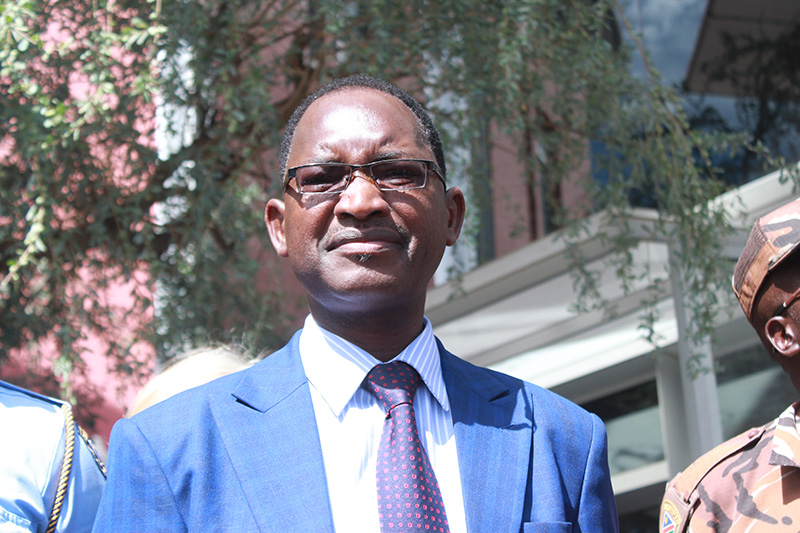Edward Mumbuu
Anti-Corruption Commission director general Paulus Noa has washed his hands off troubled rail transporter TransNamib, instead directing finance minister Iipumbu Shiimi to ensure corrective measures are taken against executives accused of impropriety and mismanagement.
Noa’s instruction, seen by this paper, is contained in a letter dated 13 September 2022. “The findings reveal certain irregularities and mismanagement of TransNamib resources by the management of the company,” Noa asserts in the letter.
It was penned after the ACC director general reviewed a forensic report into the affairs of the troubled entity by audit firm Ernst and Young (EY). Among others, EY recommended that the public enterprises – which now resorts under the ministry of finance – or the TransNamib board, consider instituting disciplinary action against employees and executives who failed to meet their performance targets.
The leaked report also lifted the lid on a myriad of irregularities at the rail entity – ranging from ineffective and inadequate utility costs to dodgy contracts and manipulated lease agreements. Like EY, Noa dropped the ball in finance minister Shiimi’s court, as he thinks the alleged irregularities do not fall under the anti-graft body’s jurisdiction.
He said: “Such irregularities and mismanagement, as appropriately recommended, fall within the powers of the board of TransNamib to take corrective measures against the management, and not necessarily fall within the ambit of the ACC for corruption investigations.”
Noa ignored questions regarding the contents of the letter, while attempts to reach him on his mobile phone were futile yesterday. “We, therefore, advise that you [Shiimi] direct the board to take action as recommended by the investigation team,” Noa is further quoted as saying.
Shiimi oversees the now-defunct public enterprises ministry as a directorate. New Era has also seen an exchange between Shiimi and TransNamib’s deputy board chairperson Gaenor Michaels dated 26 September 2022.He was responding to her letter of 8 September 2022. It would appear, however, that Michaels complained about media reports on the intricate details of the EY report. Shiimi did not entertain this, maintaining that the State-owned company is not immune to public scrutiny. “I concur with you that the media coverage was unfortunate, but we are serving the public, thus are open to media scrutiny,” Shiimi said.
The minister then assured Michaels that: “I will share the key recommendations to the board for your urgent action and attention. ”Shiimi also informed Michaels about Noa’s letter: “I am pleased to inform you that the ACC has responded (as per the attached letter), and that no action was required from them.”
Michaels yesterday said the board is waiting for Shiimi’s summarised recommendations of the report.
“As reported by TransNamib Holdings Limited before, the existing board members and newly- appointed board members have not been privy to the EY report, and have also not received a copy of the report to date,” she stated. “We are satisfied in the interim that all allegations of corruption as reported in the media have been found to be untrue and baseless, and look forward as a board to address any issues that might be recommended to improve TransNamib’s administration.”
Details
A 2021 report by the Namibia Press Agency (Nampa) pointed out that the over-compensation of non-performing executives was one of the major issues at the struggling entity. The executives were also paid performance bonuses while there was no performance management system in place to gauge their work, the auditors found.
“[The] ministry of public enterprises and/or the board could consider recovering the ostensibly irregular and unauthorised payment of performance bonuses from the relevant beneficiaries,” EY recommended. “We could not place any reliance on the property, asset register, property valuations or the contract administration,” the firm found.
EY further detected many inconsistencies in respect of how lease amounts for properties were determined. In August, TransNamib auctioned off properties to raise funds in a bid to remain afloat. Currently, the company records losses between N$10 million and N$20 million monthly.
“It is a properties’ auction. It takes about two months to finalise the entire process. We will be able to share the information then,” the company’s spokesperson Abigail Raubenheimer said last month.
TransNamib’s property portfolio is estimated to be worth around N$2.5 billion. Haunted board Last month, Shiimi appointed new directors to the TransNamib board to fill vacancies, including those necessitated by the hasty resignations of former chairperson Lionel Matthews and his deputy Sigrid Tjijorokisa.
They resigned on the same day, but for different reasons. It was also the day before a strike started. The company and union later resolved their differences, and the workers returned to their stations after about two weeks. Matthews’ purported refusal to disclose contents of the EY report forced Tjijorokisa to quit. She had no faith in the board under Matthews’ stewardship. “I am of the view that in the context of all the material irregularities brought to the fore and the current performance and employee climate of the company, that this decision is not only unacceptable, but also grossly negligent and irresponsible,” she stated.
Meanwhile, Matthews allegedly stepped down to protect his reputation built through decades of hard work. “I will not allow my reputation and my character to be drawn into question by the union in public… where TransNamib is, is not my doing. It is the mismanagement that happened by those who came before me,” Matthews charged.
-emumbuu@nepc.com.na



